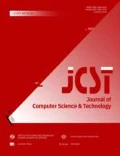Abstract
This paper addresses the problem of fault-tolerant multicast routing in wormholerouted multicomputers. A new pseudo-cycle-based routing method is presented for constructing deadlock-free multicast routing algorithms. With at most two virtual channels this technique can be applied to any connected networks with arbitrary topologies. Simulation results show that this technique results in negligible performance degradation even in the presence of a large number of faulty nodes.
Similar content being viewed by others
References
Dally W J, Seitz C L. The torus routing chip.Journal of Distributed Computing, 1986, 1(3): 187–196.
McKinley P K, Xu H, Esfahnian A H, Ni L M. Unicastbased multicast communication in wormhole-routed networks.IEEE Trans. Parallel and Distributed Systems, Dec. 1994, 5(12): 1252–1265.
Robinson D F, McKinley P K, Cheng B H C. Optimal multicast communication in wormhole-routed torus networks.IEEE Trans. Parallel and Distributed Systems, Oct. 1995, 6(10): 1029–1042.
Xu H, Gui Y, Ni L M. Optimal software multicast in wormhole-routed multistage networks.IEEE Trans. Parallel and Distributed Systems, June 1997, 8(6): 597–607.
Ni L M. Should scalable parallel computers support efficient hardware multicast? InProc. the 1995 ICPP Workshop on Challenges for Parallel Processing, Aug. 1995, pp.2–5.
Lin X, McKinley P K, Ni L M. Deadlock-free multicast wormhole routing in 2-D mesh multicomputers.IEEE Trans. Parallel and Distributed Systems, Aug. 1994, 5(8): 793–804.
Qiao W, Ni L M. Adaptive routing in irregular networks using cut-through switches. InProc. Int. Conf. Parallel Processing, 1996, 1: 52–60.
Panda D K, Singal S, Kesavan R. Multidestination message passing in wormholek-aryn-cube networks with base routing conformed paths.IEEE Trans. Parallel and Distributed Systems, Jan. 1999, 10(1): 76–95.
Kesavan R, Panda D K. Multiple multicast with minimized node contention on wormholek-aryn-cube networks.IEEE Trans. Parallel and Distributed Systems, April 1999, 10(4): 371–393.
Libeskind-Hadas R, Watkins K, Hehre T. Fault-tolerant multicast routing in the mesh with no virtual channels. InProc. the 2nd IEEE Symposium on High-Performance Computer Architecture, San Jose, CA, Feb. 1996, pp.180–190.
Garey M R, Johnson D S. Computers and Intractability: A Guide to the Theory of NP-Completeness. Freeman, 1979.
Tseng Y C, Yang M H, Juang T Y. An Euler-path-based multicasting model for wormhole-routed networks with multi-destination capability. InProc. Int. Conf. Parallel Processing, Minneapolis, USA, Aug. 1998, pp.366–373.
Tseng Y C, Panda D K, Lai T H. A trip-based multicasting model in wormhole-routed networks with virtual channels.IEEE Trans. Parallel and Distributed Systems, Feb. 1996, 7(2): 138–150.
Dally W J. Virtual channel flow control.IEEE Trans Parallel and Distributed Systems, Mar. 1992, 3(2): 194–205.
Ni L M, McKinley P K. A survey of wormhole routing techniques in directed networks.IEEE Computer, Feb. 1993, 26: 62–76.
Author information
Authors and Affiliations
Corresponding author
Additional information
Song JianPing received the B.S. degree in computer science from University of Science and Technology of China in 1997 and the Ph.D. degree in computer science from Institute of Computing Technology, the Chinese Academy of Sciences, in 2002. His current research interests include interconnection networks and wireless communication.
Hou ZiFeng is a professor and the chief researcher of the Legend Corporate Research & Development, Beijing. His current research interests include high-performance system architecture and wireless communication.
Xu Ming received the B.S. degree in computer science from Tsinghua University in 1999 and the M.S. degree in computer science from Institute of Computing Technology, the Chinese Academy of Sciences, in 2002. His current research interest is wireless communication.
Rights and permissions
About this article
Cite this article
Song, J., Hou, Z. & Xu, M. Pseudo-cycle-based multicast routing in wormhole-routed networks. J. Comput. Sci. & Technol. 18, 717–724 (2003). https://doi.org/10.1007/BF02945459
Received:
Revised:
Issue Date:
DOI: https://doi.org/10.1007/BF02945459




